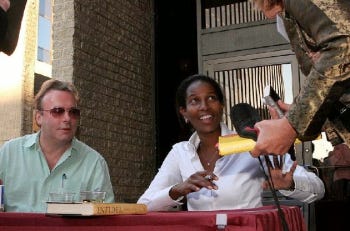Here in the UK, there’s been great interest of late in the possibility that not only has the New Atheism faded away, but a revival of interest in Christianity may be on the cards.
Justin Brierley has produced a book and podcast series on The Surprising Rebirth of Belief in God and writers like
and have been sharing their experiences of being drawn - unexpectedly, and even reluctantly - to Christianity. Just in the last week or so, Ayaan Hirsi Ali, once a major figure in New Atheism, has announced that she has become a Christian.Ayaan Hirsi Ali, pictured with Christopher Hitchens at a book signing.
Responding to this news in an open letter to Ali,
wrote:[You quoted Roger Scruton as saying to you that] you act like a Christian, you behave like a Christian, therefore you are a Christian.
But Ayaan, that is so wrong. How you, or I, behave is utterly irrelevant. What matters is what you believe. What matters is the truth claims about the world which you think are true.
This seems as clear a statement as you could ask for of a modern drift, in dealing with religion, towards separating out words from the rest of life.
It hasn’t just happened in the West. In Japan, modernising Buddhists like Inoue Enryō tried to re-invent Japanese Buddhism around the turn of the twentieth century as an abstract philosophy with therapeutic potential. Out went countless Buddhist claims about the world, regarded now as ‘pure superstition’. Buddhist rituals were turned into activities for calming the mind - and for strengthening citizens’ mettle: Inoue was an ardent nationalist. The high philosophy that remained was promoted as being entirely in line with the modern sciences.
Statues at the Philosophers’ Park in Nakano City, Japan, established in 1906 by Inoue Enryō
I can see the case for doing this with religion: whether it’s Christianity or Buddhism, to try to excise entirely something so deeply woven into a culture - language, laws and ethics; churches and temples - is difficult and destructive. Better to find new meanings and new roles for cherished religious ideas. The problem, I think, is the chasm that so-called ‘religious modernism’ opens up, between words and experience.
Going to midnight Mass as a child and seeing people’s faces in the glow of the candles they were holding, incense snaking through the pews, I sometimes felt as though everything was coming together: the words of the liturgy, spoken and sung; senses and emotions fully engaged. Adolescence brought what seemed at the time to be super-charged critical abilities but in retrospect was more a hardening of the heart and an increased rigidity of thought. Then we learned about the Reformation at school, and some of us began to wonder - a little like the famous Mitchell and Webb sketch about a couple of German soldiers in WWII - ‘are we the baddies?’ In both philosophical and historical terms, Catholicism seemed increasingly unattractive.
The cliché is that a Catholic upbringing leaves you guilt-ridden. I think it leaves you question-ridden: a sense that there is something mysterious and alluring in life that invites, or even demands exploration. I became interested in Zen, which my 14-year old self imagined to be the polar opposite of Catholicism: no doctrines, no priestly hierarchy - just silence: as direct an assault as one could imagine on the truth of life, whatever it might be.
I remember sitting down to meditate, gutted at all the time I had wasted in churches - all those prayers, images, commitments and anxieties, when I should just have been heeding the advice of the punk musician and Buddhist teacher Brad Warner, to Sit Down and Shut Up.
Left: a faded copy of my trusty teenage guide to Zen, based on a book by Christmas Humphreys, founder of the London Buddhist Society.
Right: Brad Warner’s very different take on the same subject.
Zen left me a little cold in the end - an indictment not of the tradition itself but rather the modernised, psychologised version that I imbibed. The philosopher Herbert Fingarette once said that psychologisation - considering an idea or practice in terms of its psychological effects - is what people do when they don’t really value an idea anymore, or they don’t understand what to do with it. We’ve tried this a lot with religion, and it strikes me as a dead-end.
I’m still a fan of silence. I agree with
, himself a practitioner of Zen for a while, when he warns about the ‘portcullis of words’ descending - reducing our contact with the world to the juggling of concepts in our heads. And a central feature of G.K. Chesterton’s fabulously Woodhousian apologetics - where God and Jesus often share the page with gentleman’s clubs and housemaids - is a caution about expecting discursive reasoning to settle questions that are at once very big and very simple. Beware, he wrote, of embarking on ‘elephantine adventures in pursuit of the obvious’.(Incidentally, it’s fascinating to set Chesterton alongside the unknown ancient author of the Kena Upanishad: 'That which is not seen by the eye / but that by which the eye sees: know that to be God’. Fans of C.S. Lewis will do doubt hear his own famous line in here: ‘I believe in Christianity as I believe that the Sun has risen: not only because I see it but because by it I see everything else.’)
But inevitably, you take your thoughts, feelings - your whole worldview - with you when you sit down for meditation or silent prayer. Words frame the experience, and they help to shape its fruits.
After a meditation retreat a few years ago, for about half a day everything around me had an extraordinary presence to it - trees; other people; even a dog whizzing by in the back of a car, eyeballing me with what seemed like deep, significant intent.
What is this, I wondered? I found my options limited to speculating about the effects of meditation on my brain or else casting around for a vaguely spiritual interpretation. Those given to an earthy turn of phrase might call the latter ‘turd-polishing’: imposing meaning on what, deep down, we suspect are inherently meaningless and ineluctable material processes.
The Victorians knew a thing or two about polishing a turd. Amidst uncertainty over Christianity’s claims, some became interested in Buddhism and Hinduism. But many more began a steady drift towards poetry and agnosticism, in life and death alike, which continued into the twentieth century. In Surprised by Hope, N.T. Wright tracks this process via the changing forms of funeral services. One of the most popular funeral poems, first published in 1934, begins:
Do not stand
By my grave, and weep.
I am not there,
I do not sleep—
I am the thousand winds that blow
I am the diamond glints in snow
I am the sunlight on ripened grain,
I am the gentle, autumn rain.
The poet Edwin Arnold did something similar in his romantic evocation of the Buddha’s life and teachings in The Light of Asia (1879). He imagined the attainment of nirvana, and by extension a person’s death, as a ‘dewdrop’ slipping into ‘the shining sea’: an inspired, deeply consoling choice of imagery.
But sometimes neither silence nor poetry is enough - even for poets. For a time, Samuel Taylor Coleridge was enthralled by Indian Idealism, in particular an image of infinity that featured the deity Vishnu floating on a vast ocean. But he finally dismissed it as a ‘painted Atheism’: for all its beauty, Coleridge concluded, Indian sacred literature appeared not to refer to anything beyond the mundane, material world. In which case, what was the point?
. . . If the breath
Be Life itself, and not its task and tent,
If even a soul like Milton’s can know death;
Oh Man! thou vessel purposeless, unmeant . .
(‘Human Life’, Samuel Taylor Coleridge)
North Devon, one of Coleridge’s favourite parts of the world.
This is why some of the recent thinking and writing on Christianity, and on religion in general, is of such interest: it has room for silence and poetry but it’s characterised, too, by a renewed faith in the power of words: to at least gesture at truth, and to help people recognise the assumptions and metaphors that may be holding them back.
One of the recurring themes in a fascinating series of dialogues between the scientist Rupert Sheldrake, who spent formative years living and working in India, and the writer and psychotherapist Mark Vernon, is the possibility that physical matter is an aspect of, or emanation of Mind or the divine.
The important word here is ‘possibility’: allow, perhaps just as a thought experiment, that this might be true - and see where it takes you.
Getting at the root, or source, or cause of something no longer involves just chopping up the material world into ever-smaller bits, or tracing a chain of physical cause-and-effect back into the past. Some of the most treasured aspects of being human - love, desire, joy, goodness - turn out to be built into reality itself, reflected in but not ‘of’ the material world. Poetry is an arrow fired straight at the heart of reality, rather than human word-play open to evolution-made-me-do-it forms of explanation.
An enhanced quality of silence is in the offing, too. Ludwig Wittgenstein’s famous phrase - ‘it is not how things are that is mystical, but that it exists’ - doesn’t have to be met with brow-furrowing and puzzling-through. A better response might be an unencumbered appreciation of sheer presence - from which who knows what might emerge?
If words can narrow our sense of possibility - they certainly have mine, over the years - then hopefully they really can help to open it up again, too: not necessarily persuading us of this or that ‘true story’, but by helping to heal the split between words and the rest of life - perhaps, in the process, clearing a path towards something unexpected.
—
Images:
Ayaan Hirsi Ali and Christopher Hitchens: Provoking Hitchens (fair use).
Philosophers’ Park: Japan Travel (fair use).
North Devon: i News (fair use).







